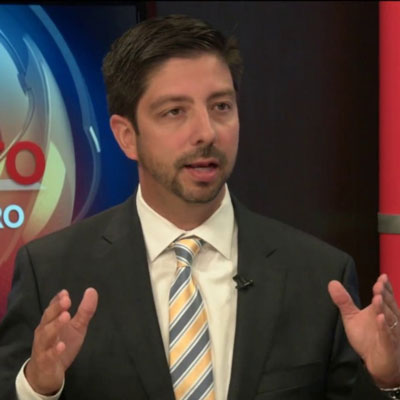CEO of Indianapolis Power and Light Believes Immigrants Power State Economy
Date: September 22, 2016
After graduating from university in Puerto Rico, Rafael Sanchez and his wife sold their belongings and moved to Fort Wayne, Indiana, to study law – only to realize that Fort Wayne didn’t have a law school. “When you’re young and stupid, your only due diligence is, ‘Where do we know people?’” Sanchez laughs. They lived out of suitcases and slept on friends’ sofas while they found their feet, and spent several years working at a local bank before eventually gaining law degrees from Indiana University Bloomington. Both Sanchez and his wife went on to have successful legal careers: Sanchez’s wife is now a vice president and general counsel at Swiss instrumentation firm Endress+Hauser, while Sanchez made partner at Bingham Greenebaum Doll, then branched out into the business world. Now, he’s president and CEO of Indianapolis Power & Light Company, a utility that has revenues of $1.2 billion and employs 1,400 people across central Indiana. “America was a land of opportunity for us,” Sanchez says. “It gave us a chance to get the right education, and make a decent living, and realize our goals.”
 Since his arrival in Indiana, Sanchez has poured himself into community initiatives, taking leadership positions with United Way of Central Indiana and the Indiana Chamber of Commerce, serving as secretary for Indianapolis’s Super Bowl bid, and co-chairing Plan 2020, the city’s bicentennial planning group. This engagement has shown Sanchez the strategic importance of immigrants to Indiana and Indianapolis, both at present, and with an eye on the future. “We’ve seen an emerging class of individuals who come from different countries setting up businesses here,” he says. “And that number is exponentially growing.” Recognizing Indianapolis as an increasingly cosmopolitan city, big companies like Eli Lilly and Salesforce.com have set up their headquarters there. “The more multicultural a city is, the more successful that city will be at attracting corporate headquarters and spurring economic development,” Sanchez says.
Since his arrival in Indiana, Sanchez has poured himself into community initiatives, taking leadership positions with United Way of Central Indiana and the Indiana Chamber of Commerce, serving as secretary for Indianapolis’s Super Bowl bid, and co-chairing Plan 2020, the city’s bicentennial planning group. This engagement has shown Sanchez the strategic importance of immigrants to Indiana and Indianapolis, both at present, and with an eye on the future. “We’ve seen an emerging class of individuals who come from different countries setting up businesses here,” he says. “And that number is exponentially growing.” Recognizing Indianapolis as an increasingly cosmopolitan city, big companies like Eli Lilly and Salesforce.com have set up their headquarters there. “The more multicultural a city is, the more successful that city will be at attracting corporate headquarters and spurring economic development,” Sanchez says.
America was a land of opportunity for us. It gave us a chance to get the right education, and make a decent living, and realize our goals.
Sanchez also sees the benefits of immigration through his work with Indianapolis Power & Light, since its parent company, AES Corporation, is a multinational firm with subsidiaries in Brazil, Chile, and elsewhere. “We have a lot of talent and innovation that comes from people from different countries mixing together,” he explains. “Why on earth would we create a bottleneck that would delay, or put on a slow drip, the influx of new ideas and innovation and talent into the country?” What’s needed, Sanchez says, is an approach to immigration that gives businesses the chance to bring in the workers they need without having to wade through inordinate amounts of red tape. “What we currently have is inadequate,” he says. “We can’t achieve the level of diversity we need to stay competitive, and to create the innovative working environment that we want.”
As a Puerto Rican, Sanchez says, coming to the United States was as easy as buying a plane ticket – and his own success is a sign of the potential benefits the country could reap if it makes it easier for talented and ambitious people from Latin America, or the rest of the world, to come here. Many of Sanchez’s friends from countries like Argentina or Mexico or Colombia are just as driven and talented as he is, he says, but they face a far harder time getting visas. “I believe we have to find a sweet spot that balances our security interests with good business practices,” he says. “Large employers need the flexibility to attract and employ talent from around the world. The current system stifles the business creativity and innovation we need to remain competitive.”
